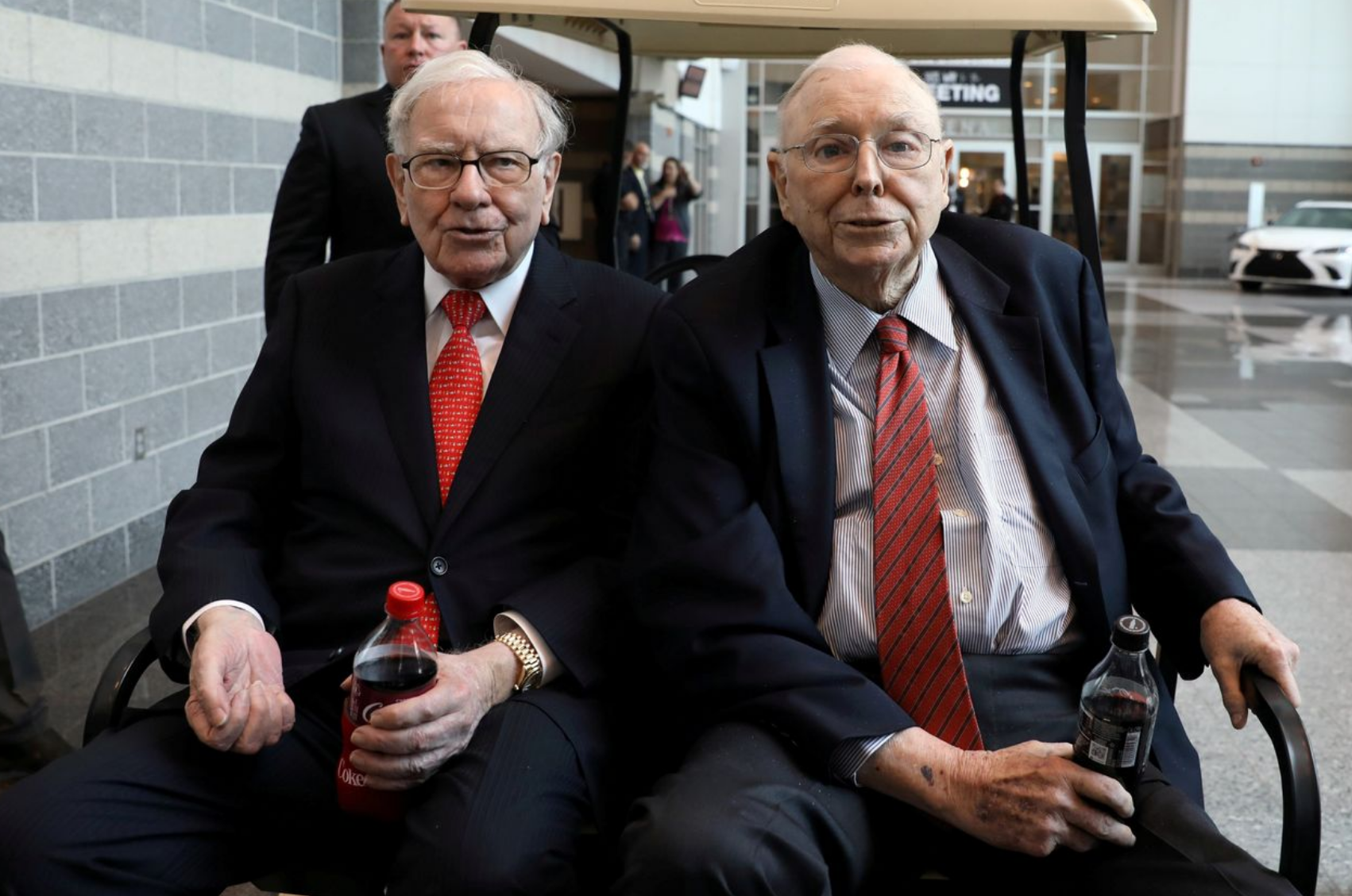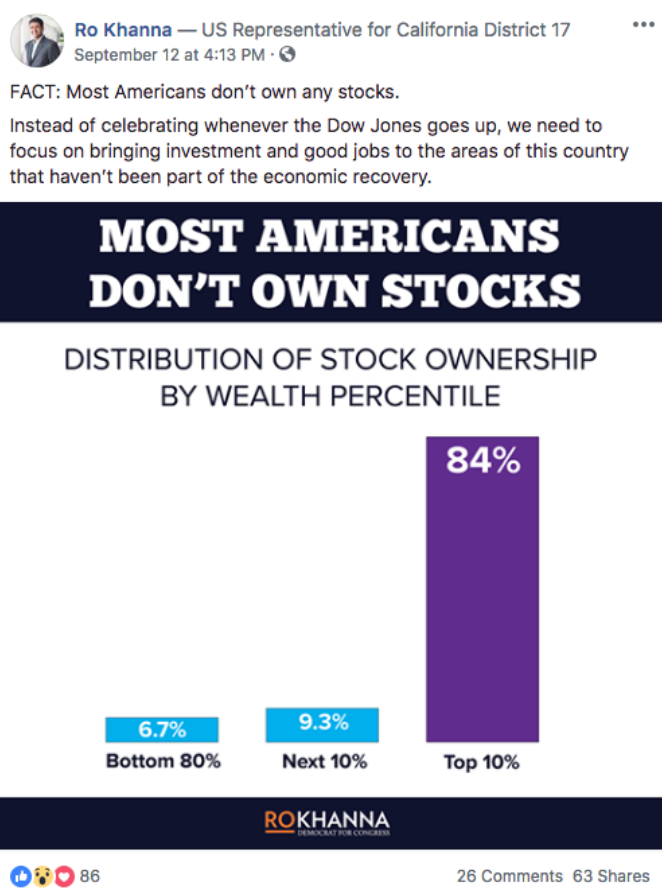Buffett Defends Berkshire Amid Lagging Performance (#GotBitcoin?)

Trailing stock market, the investor says: ‘I’m betting my entire net worth’ that company endures. Buffett Defends Berkshire Amid Lagging Performance (#GotBitcoin?)
Berkshire Hathaway Inc. has underperformed the S&P 500 for a decade, forcing Warren Buffett into a position he rarely resides: on the defensive.

At the company’s widely attended annual meeting Saturday, Mr. Buffett, Berkshire’s 88-year-old chairman and chief executive, urged investors to keep the faith on a host of issues, including overall performance, his plans for future stock buybacks and even transparency.
On performance, he acknowledged that Berkshire has trailed stocks during a historic bull market but argued it hasn’t grown too big to beat the market in the future.
“It’s a question of, can you invest truly large sums reasonably well?” he said.
He noted that his own will instructs that his Berkshire shares stay invested in Berkshire after his death until they are eventually distributed to charity.
“I have a lot of confidence in the ability of the Berkshire culture to endure and that we have the right people to make sure that that happens,” he said. “I’m betting my entire net worth on that.”
He also said Berkshire would be willing to spend $100 billion buying back its own stock in future years if he thought it was trading at an attractive price. Berkshire bought back $1.7 billion in stock in the first three months of the year. Over the same span, the company’s cash pile grew to $114.2 billion from $111.9 billion.
Thomas Russo, partner at Gardner Russo & Gardner, a longtime holder of Berkshire shares, said he hopes Berkshire does more share buybacks while Mr. Buffett is still in charge.
“They need to buy back a significant amount of it in order to have free runway to do it when Warren’s gone,” he said. “Going forward, it will be an important way to deploy capital.”
Berkshire, a $537 billion conglomerate, owns dozens of companies and invests billions in the stock market. Since Mr. Buffett took over the company in 1965, its stock produced a compound annual gain of 21% through the end of 2018, compared with 9.7% for the S&P 500 including dividends. Many early Berkshire shareholders have become millionaires.
But in the past decade, Berkshire’s stock rose by 259% and the S&P 500 returned a total of 314%. Berkshire shares are up 7.1% so far this year, while the index has risen nearly 18%.
Berkshire’s many businesses continue to churn out cash faster than Mr. Buffett can spend it.
“It’s been disappointing,” said James Shanahan, senior equity-research analyst at Edward Jones. Excluding buybacks, “if they need to put $100 billion to work, they need a downturn for that.”
Mr. Buffett is best known for swooping in during market slumps to strike attractive deals. In recent years, however, public markets have rallied while the value of private companies has also surged. He has said that prices for good businesses are too high for his taste.
Some shareholders worry that Berkshire’s access to favorable deals could dry up after Mr. Buffett’s death. Companies come to Berkshire for cash but also for Mr. Buffett’s seal of approval, which can shore up broader shareholder sentiment.
Ajit Jain and Greg Abel, Berkshire vice chairmen and Mr. Buffett’s two potential successors, are well-respected within the organization but they rarely speak publicly and lack Mr. Buffett’s fame.
This year, Mr. Buffett gave his lieutenants more time in the spotlight. The two men oversee Berkshire’s day-to-day business operations, and each answered two questions at the annual meeting.
Mr. Buffett declined an audience member’s request to hear from Todd Combs and Ted Weschler, Berkshire’s portfolio managers, who each oversee $13 billion for Berkshire.
Messrs. Weschler and Combs have invested in technology companies that are outside Mr. Buffett’s traditional area of expertise. Recently, one of the two invested in Amazon.com Inc., Mr. Buffett said. Amazon shares are trading near their record high.
Mr. Buffett said Berkshire isn’t deviating from its value-investing approach with its Amazon stake or any others.
One of the managers slightly beat the S&P 500 in the first quarter, Mr. Buffett said, while the other trailed it. “It’s been a tough period to beat the S&P,” he said. “They’ve made us a lot of money, but they made it during a market where you’d have made a lot of money in the S&P as well.”
Mr. Buffett also defended Berkshire against criticism that its reporting isn’t sufficiently transparent. Because of Berkshire’s size, it doesn’t separate out financial results for many of its subsidiaries, even companies that would be sizable businesses on their own.
Mr. Buffett said it’s more important for shareholders to understand how the business runs and its approach to capital allocation than to see the financial details of each unit’s operations.
Updated: 11-2-2019
Berkshire Hathaway’s Cash Pile Hits a Record
Conglomerate’s earnings fall as unrealized investment gains decline.
Berkshire Hathaway Inc. BRK.B 1.53% ’s cash pile hit a record in the third quarter, as Warren Buffett continued his hunt for large companies to buy at attractive prices.
Berkshire held $128 billion in cash or short-term Treasurys as of Sept. 30, the company said Saturday, up from $122 billion at the end of the second quarter.
Berkshire bought back about $700 million of its own shares in the third quarter, bringing its total buybacks for the year to $2.8 billion, the company said. The Omaha, Neb., conglomerate changed its buyback policy last year, and some shareholders are frustrated the company hasn’t spent significantly more cash repurchasing its stock.
Berkshire reported third-quarter net earnings of $16.5 billion, or $10,119 per Class A share equivalent, from $18.5 billion, or $11,280 a share, in the year-earlier period. Last year’s third-quarter earnings surged due to unrealized investment gains.
Operating earnings, which exclude some investment results, rose to $7.9 billion from $6.9 billion in the year prior.
The conglomerate runs a large insurance operation as well as railroad, utilities, industrial manufacturers and retailers. Its holdings include recognizable names like Dairy Queen, Duracell, Fruit of the Loom, Geico and See’s Candies.
Berkshire’s insurance business sits at the core of its moneymaking machine. Insurance brings in billions of dollars of “float,” upfront premiums customers pay and that Berkshire invests for its own gain. Berkshire also holds large stock investments, including in Apple Inc. and Wells Fargo & Co. As of Sept. 30, Berkshire held nearly $100 billion in financial-services stocks, underscoring the size of its bet on the future of the U.S. economy.
Class A shares closed Friday at $323,400, up 5.7% for the year. In contrast, the S&P 500 is up 22% this year.
The 89-year-old Mr. Buffett, whose shrewd investments have earned him the nickname “the Oracle of Omaha,” has complained in recent years about the challenge of finding acquisition targets that are large enough to move the needle for Berkshire and are reasonably priced.
“Prices are sky-high for businesses possessing decent long-term prospects,” he wrote in his 2018 letter to shareholders.
One of Mr. Buffett’s key lieutenants in recent years, Tracy Britt Cool, said in September that she would leave Berkshire in 2020 to start her own investment vehicle.
Updated: 2-23-2020
Warren Buffett’s Berkshire Hathaway Stock Underperforms the Most Since 2009
The conglomerate’s stock rose 11% in 2019 compared with a 31.5% total return in the S&P 500.
Warren Buffett sought to reassure investors about Berkshire Hathaway Inc.’s long-term future following an underwhelming year for the conglomerate’s performance.
The 89-year-old Mr. Buffett, Berkshire’s chairman and chief executive, is renowned for his long-term success as a stock investor and deal maker. But in recent years, Berkshire’s stock performance has failed to beat the market.
Berkshire’s stock rose 11% in 2019 compared with a 31.5% total return in the S&P 500, including dividends—Berkshire’s biggest underperformance since 2009.
Mr. Buffett has long said that investors should focus on companies’ long-term performance and ignore shorter-term fluctuations in the stock market.
Some investors have agitated for Berkshire to spend more of its massive cash pile buying back shares or paying a dividend. They have also asked to hear more from Ajit Jain and Greg Abel, the two Berkshire vice chairmen who are leading contenders to succeed Mr. Buffett as CEO.
In his annual letter to shareholders released Saturday, Mr. Buffett mostly skirted the issue of Berkshire’s underperformance relative to the broader market. But he said shareholders should not be worried about the future of Berkshire after he or his 96-year-old business partner, Berkshire Vice Chairman Charlie Munger, die.
“Your company is 100% prepared for our departure,” Mr. Buffett said.
He also said that at Berkshire’s annual meeting in May, shareholders will be able to ask questions of Messrs. Jain and Abel. That is a change from previous meetings, when any comments by Berkshire leaders besides Messrs. Buffett and Munger have been rare.
“I’m so excited for that. I think it’s an absolutely terrific idea,” said Thomas Russo, partner at Gardner Russo & Gardner, a longtime holder of Berkshire shares. He said it would be helpful for shareholders to hear more directly from Messrs. Jain and Abel about overseeing the day-to-day operations of Berkshire’s companies.
Berkshire increased its buybacks in the fourth quarter to $2.2 billion, bringing its total repurchases for the year to $5 billion, the company said. That still barely dented the company’s huge pile of cash, which totaled $128 billion as of Dec. 31, the company said Saturday, slightly down from a record $128.2 billion at the end of the third quarter.
In his letter, Mr. Buffett lamented the difficulty of finding attractively priced acquisition targets that are big enough to move the needle for Berkshire.
“The opportunities to make major acquisitions possessing our required attributes are rare,” he said.
Berkshire’s biggest deal in 2019 was a $10 billion investment in Occidental Petroleum Corp. ’s bid to acquire Anadarko Petroleum Corp.
Some of Berkshire’s 60-odd subsidiaries completed acquisitions, but those deals tend to be small. Berkshire spent $1.7 billion on bolt-on acquisitions in 2019, the company said, up from $1 billion the prior year.
“I think there’s more capacity for buybacks,” said James Shanahan, senior equity-research analyst at Edward Jones. “It’s no doubt that the significant outstanding cash balances have been an extraordinary drag on earnings.”
The Omaha, Neb., conglomerate reported net earnings of $29.2 billion, or $17,909 per Class A share equivalent, up from a loss of $25.4 billion, or $15,467 a share, the year before. Berkshire’s earnings were mostly boosted by unrealized investment gains, while its results a year ago were dragged down by an unexpected write-down at Kraft Heinz Co.
Berkshire posted operating earnings of $4.4 billion, down from $5.7 billion a year earlier, due to lower results in insurance underwriting and some of Berkshire’s smaller operating businesses. Operating earnings exclude some investment results and Mr. Buffett has said they are more reflective of Berkshire’s performance than net earnings, which can fluctuate widely due to unrealized investment gains or losses.
Berkshire’s Class A shares closed Friday at $343,499, up 1.1% for the year. In contrast, the S&P 500 is up 3.3% this year.
Cathy Seifert, equity analyst CFRA Research, said she thought Mr. Buffett should have addressed Berkshire’s results compared with the index more directly. “It’s easy to say you’re not concerned about short-term performance,” she said. But “this short-term underperformance could turn into a longer-term underperformance.”
Mr. Buffett also used his letter to discuss corporate boards of directors, which he said are often ill-equipped to oversee companies and incentivized not to challenge executives. Noting that he has served as a director for 21 public companies over the past 62 years, Mr. Buffett complained that board members are often too reliant on their board-related income to truly function as independent overseers. He also said many board members are not experts in finance or investing.
“Almost all of the directors I have met over the years have been decent, likable and intelligent,” Mr. Buffett said. “Nevertheless, many of these good souls are people whom I would never have chosen to handle money or business matters. It simply was not their game.”
Berkshire runs a large insurance operation as well as railroad, utilities, industrial manufacturers and retailers. Its holdings include recognizable names like Dairy Queen, Duracell, Fruit of the Loom, Geico and See’s Candies.
Berkshire’s insurance business sits at the core of its moneymaking machine. Insurance brings in billions of dollars of “float,” upfront premiums customers pay and that Berkshire invests for its own gain. Berkshire also holds large stock investments, including in Apple Inc. and Wells Fargo & Co.
Updated: 5-3-2021
Berkshire Chooses Greg Abel As Warren Buffett’s Successor In CEO Role
The choice of Mr. Abel to eventually lead Berkshire Hathaway answers question that had hovered over the firm for decades.
Warren Buffett said Greg Abel will succeed him as Berkshire Hathaway Inc.’s BRK.B 1.60% chief executive should he leave the role in the short term.
“The directors are in agreement that if something were to happen to me tonight, it would be Greg who’d take over tomorrow morning,” Mr. Buffett told CNBC.
A person familiar with Berkshire’s board confirmed Mr. Abel is the current pick to replace Mr. Buffett should the 90-year-old billionaire leave the role imminently.
The choice answers a question that had hovered over Berkshire for decades. A 2018 decision to name to the board Ajit Jain, who runs the company’s insurance business, and Mr. Abel, who heads the conglomerate’s other operations, indicated they were the top choices as Berkshire’s next CEO.
Charlie Munger, Berkshire’s longtime vice chairman, had appeared to drop a major clue that Mr. Abel was the pick on Saturday, during Berkshire’s annual meeting with shareholders. When asked about the importance of Berkshire’s culture, Mr. Munger noted that “Greg will keep the culture.”
Mr. Abel’s remit includes railroad holdings, utilities, manufacturers, retailers and even auto dealerships.
“He does a far better job of that than I was doing previously,” Mr. Buffett said.
In his 2012 letter to shareholders, Mr. Buffett revealed that the board had identified the company’s next CEO. He didn’t name the person but said it was someone the board knew well.
Mr. Buffett’s son, Howard Buffett, is expected to succeed his father as chairman. The company named Messrs. Abel and Jain as vice chairmen in 2018. And in the past decade, Todd Combs and Ted Weschler have joined Berkshire to help run the company’s investment portfolio.
On Saturday, Messrs. Jain and Abel described a respectful, communicative business relationship between the two of them.
Messrs. Buffett and Munger are known for their tight relationship. “We have never had an argument in 62 years,” said Mr. Buffett, describing Mr. Munger as the “vice chairman of culture”
Mr. Buffett didn’t immediately respond to a request for comment.
Related Articles:
Bloomberg Report: Fidelity Will Start Institutional Bitcoin Trading Within Weeks (#GotBitcoin?)
Bitcoin’s Lightning Comes To Apple Smartwatches With New App (#GotBitcoin?)
E-Trade To Offer Crypto Trading (#GotBitcoin)
Bitfinex Used Tether Reserves To Mask Missing $850 Million, Probe Finds (#GotBitcoin?)
21-Year-Old Jailed For 10 Years After Stealing $7.5M In Crypto By Hacking Cell Phones (#GotBitcoin?)
You Can Now Shop With Bitcoin On Amazon Using Lightning (#GotBitcoin?)
Afghanistan, Tunisia To Issue Sovereign Bonds In Bitcoin, Bright Future Ahead (#GotBitcoin?)
Crypto Faithful Say Blockchain Can Remake Securities Market Machinery (#GotBitcoin?)
Disney In Talks To Acquire The Owner Of Crypto Exchanges Bitstamp And Korbit (#GotBitcoin?)
Crypto Exchange Gemini Rolls Out Native Wallet Support For SegWit Bitcoin Addresses (#GotBitcoin?)
Binance Delists Bitcoin SV, CEO Calls Craig Wright A ‘Fraud’ (#GotBitcoin?)
Bitcoin Outperforms Nasdaq 100, S&P 500, Grows Whopping 37% In 2019 (#GotBitcoin?)
Bitcoin Passes A Milestone 400 Million Transactions (#GotBitcoin?)
Future Returns: Why Investors May Want To Consider Bitcoin Now (#GotBitcoin?)
Next Bitcoin Core Release To Finally Connect Hardware Wallets To Full Nodes (#GotBitcoin?)
Major Crypto-Currency Exchanges Use Lloyd’s Of London, A Registered Insurance Broker (#GotBitcoin?)
How Bitcoin Can Prevent Fraud And Chargebacks (#GotBitcoin?)
Why Bitcoin’s Price Suddenly Surged Back $5K (#GotBitcoin?)
Zebpay Becomes First Exchange To Add Lightning Payments For All Users (#GotBitcoin?)
Coinbase’s New Customer Incentive: Interest Payments, With A Crypto Twist (#GotBitcoin?)
The Best Bitcoin Debit (Cashback) Cards Of 2019 (#GotBitcoin?)
Real Estate Brokerages Now Accepting Bitcoin (#GotBitcoin?)
Ernst & Young Introduces Tax Tool For Reporting Cryptocurrencies (#GotBitcoin?)
Recession Is Looming, or Not. Here’s How To Know (#GotBitcoin?)
How Will Bitcoin Behave During A Recession? (#GotBitcoin?)
Many U.S. Financial Officers Think a Recession Will Hit Next Year (#GotBitcoin?)
Definite Signs of An Imminent Recession (#GotBitcoin?)
What A Recession Could Mean for Women’s Unemployment (#GotBitcoin?)
Investors Run Out of Options As Bitcoin, Stocks, Bonds, Oil Cave To Recession Fears (#GotBitcoin?)
Goldman Is Looking To Reduce “Marcus” Lending Goal On Credit (Recession) Caution (#GotBitcoin?)
Your Questions And Comments Are Greatly Appreciated.
Monty H. & Carolyn A.
Go back

Leave a Reply
You must be logged in to post a comment.